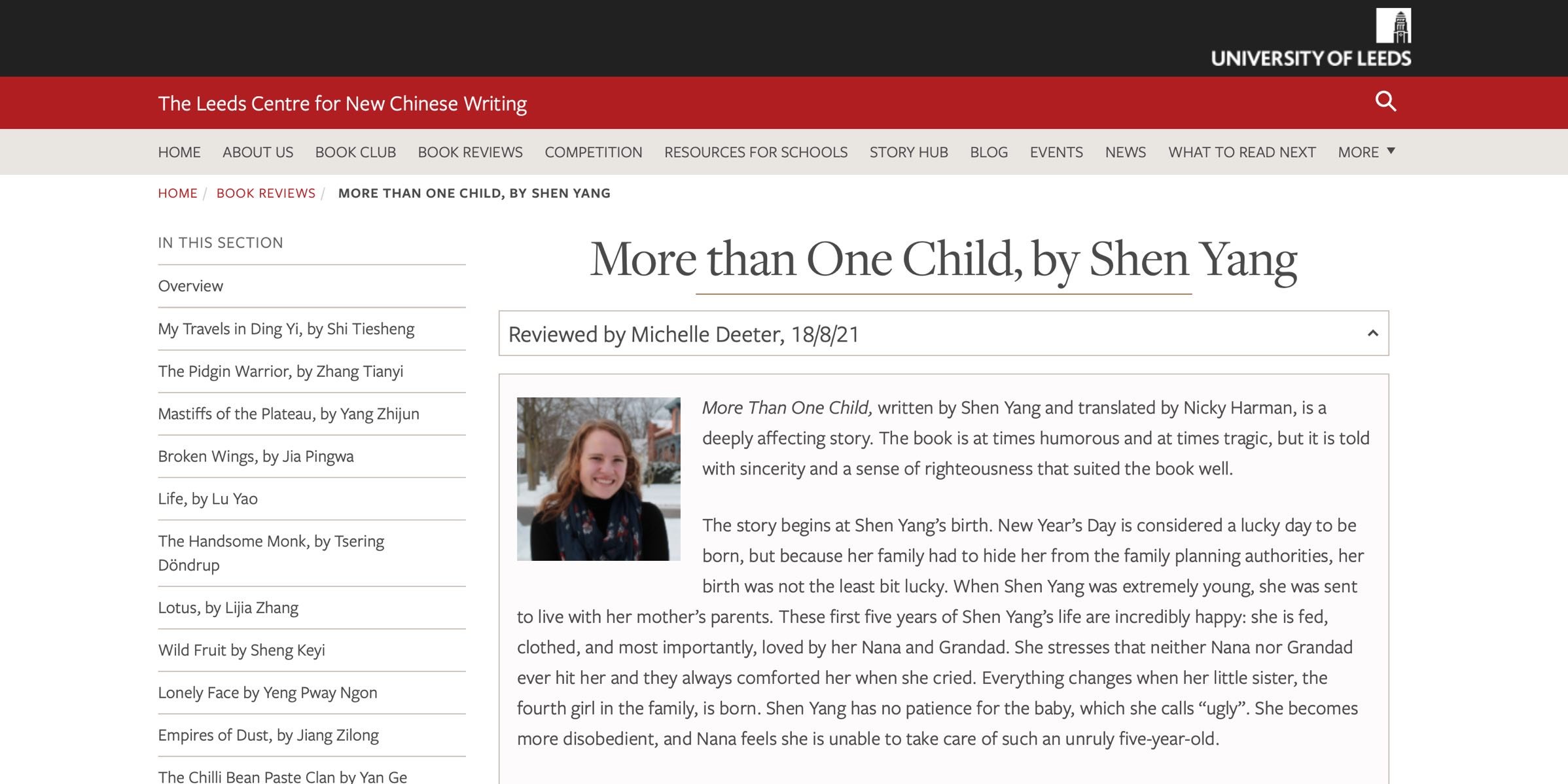⭐️ “More Than One Child” Review, by Michelle Deeter
More Than One Child, written by Shen Yang and translated by Nicky Harman, is a deeply affecting story. The book is at times humorous and at times tragic, but it is told with sincerity and a sense of righteousness that suited the book well.
The story begins at Shen Yang’s birth. New Year’s Day is considered a lucky day to be born, but because her family had to hide her from the family planning authorities, her birth was not the least bit lucky. When Shen Yang was extremely young, she was sent to live with her mother’s parents. These first five years of Shen Yang’s life are incredibly happy: she is fed, clothed, and most importantly, loved by her Nana and Grandad. She stresses that neither Nana nor Grandad ever hit her and they always comforted her when she cried. Everything changes when her little sister, the fourth girl in the family, is born. Shen Yang has no patience for the baby, which she calls “ugly”. She becomes more disobedient, and Nana feels she is unable to take care of such an unruly five-year-old.
Shen Yang spends the rest of her childhood with Aunt Wenjie, who is physically and verbally abusive. Her uncle and her cousins are apathetic at best. Aunt Wenjie accuses her of being careless when she gets the mumps at school, tries to teach her how to swim by holding her underwater, and only begrudgingly gives her the money she needs for school. Fortunately, Shen Yang has a happy-go-lucky personality, so she recovers quickly. The reader is also regaled with scenes of her adventures at school, which involve her getting into scrapes and protecting the children who were normally picked on. It was refreshing to be able to read a story set in China about a girl getting into trouble instead of a boy!
The book makes it clear that Shen Yang never gets over the abuse that she suffered. She realizes that she is “in no position to pick and choose” because she is reliant on her aunt and uncle, but at the same time she chafes at the injustice of her treatment at school and at her aunt’s house. Shen Yang never forgives her Nana or her mother for not taking care of her, and she perpetuates the same physical and verbal abuse she learned from her aunt when she meets her boyfriend. As she puts it, “All those years of cold, cruel words had left scars that could not be erased.”
I thought that the list of characters at the front of the book was helpful, and the introduction to the story helped set the tone. This was a devastating phenomenon that happened all over China, but people are generally unaware of the extent of the problem. Being able to read the colorful anecdotes of Shen Yang makes her point more persuasive, but getting the hard facts in the introduction was just as important to show what a massive impact it had on society.
One thing that I do not like about the book is that some threads are left hanging. Why was Yuan Xiaohui’s mother being tied up? Was it something sexual, or was it a misguided attempt to keep a woman with mental problem “safe” at home? What happened to Shen Yang’s sisters? Does she still have a hukou (household registration) in the name of Wu Shanying?
The translation was pitch perfect. The book featured heavy use of dialogue, ranging from children to adults. Translator Nicky Harman manages to give all of the characters believable voices, which meant the book was fast paced and enjoyable. The only change I would make is to use the pinyin names for Shen Yang’s sisters. Everyone is described by using their pinyin name except for her sisters. Using pinyin might make it harder for some readers to keep the sisters apart, but names like Star, Serene, and Moon make them sound like they were part of a fairy tale rather than regular girls born in the 1980s. Star, Serene and Moon are frequently described as “eldest sister,” “third sister” and “fourth sister” in the same sentence anyway. The character list at the front of the book is always available for the reader who becomes confused. But the sisters are mentioned less frequently so it was not a big deal. The book was excellent overall.
Reviewed by Michelle Deeter
